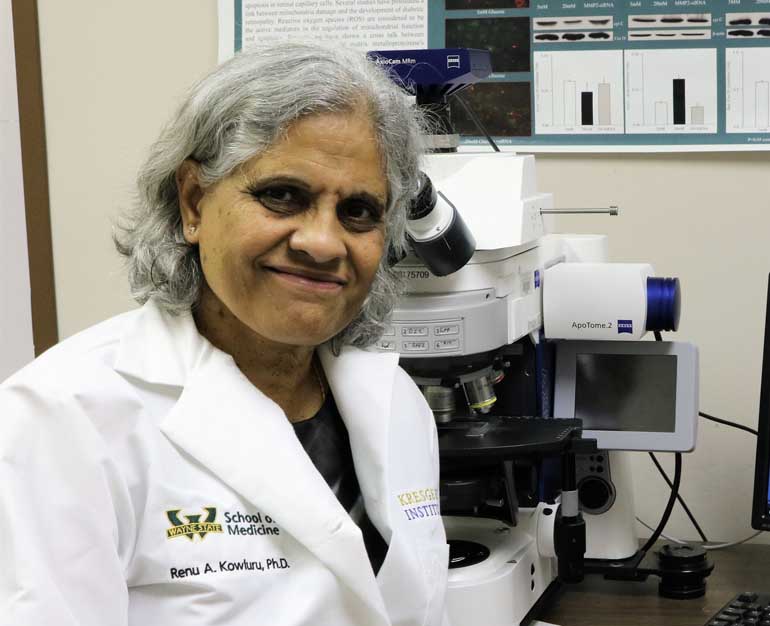The Michigan-based Thomas Foundation has renewed its support of diabetic retinopathy research at the Wayne State University School of Medicine for the 20th continuous year, this time to test a new hypothesis to cure a blinding eye disease in patients with diabetes.
Professor of Ophthalmology, Visual and Anatomical Sciences Renu Kowluru, Ph.D., is the principal investigator on the research project, and will receive $32,500 for 2020.
 Dr. Kowluru is also director of Translational Research for the department.
Dr. Kowluru is also director of Translational Research for the department.
“This project will focus on how high blood glucose, in a hyperlipidemic milieu, exacerbates epigenetic modifications and accelerates mitochondrial dysfunction,” she said. “It will test the hypothesis that hyperlipidemia, in a hyperglycemic milieu, accelerates mitochondrial dysfunction by exacerbating DNA methylation. This leads to accelerated and exacerbated mitochondrial DNA damage and compromised mitochondrial dynamics.”
Hyperlipidemia, or high cholesterol, is a term for abnormally high levels of fat, or lipids, in the blood. Methylation can change the activity of a DNA segment without changing the sequence. DNA methylation is essential for normal development. Mitochondrial DNA is located in cells that convert chemical energy from food into a form that cells can use, and was the first significant part of the human genome sequenced.
Type 2 diabetes is most often associated with obesity, and can remain undiagnosed for long periods. Retinopathy, the most common cause of acquired blindness in young adults and in diabetic patients, results from damage to the small blood vessels in the retina. All people with diabetes are at risk of developing retinopathy, and the risk increases the longer a person has diabetes.
“Unfortunately more than 20 percent of type 2 diabetic patients at the time of their diagnosis of diabetes also have some form of retinopathy. Understanding the possible mechanism by which lipids, in a hyperglycemic environment, accelerate and exacerbate diabetic retinopathy, will identify some possible therapeutic targets,” she said. “Epigenetic modifications are greatly influenced by external factors, including exercise and diet, thus strategies focusing on maintaining good lifestyle and body mass index, in addition to ameliorating hyperlipidemia, will also be beneficial in regulating epigenetic modifications and preventing or retarding retinopathy in diabetic patients.”